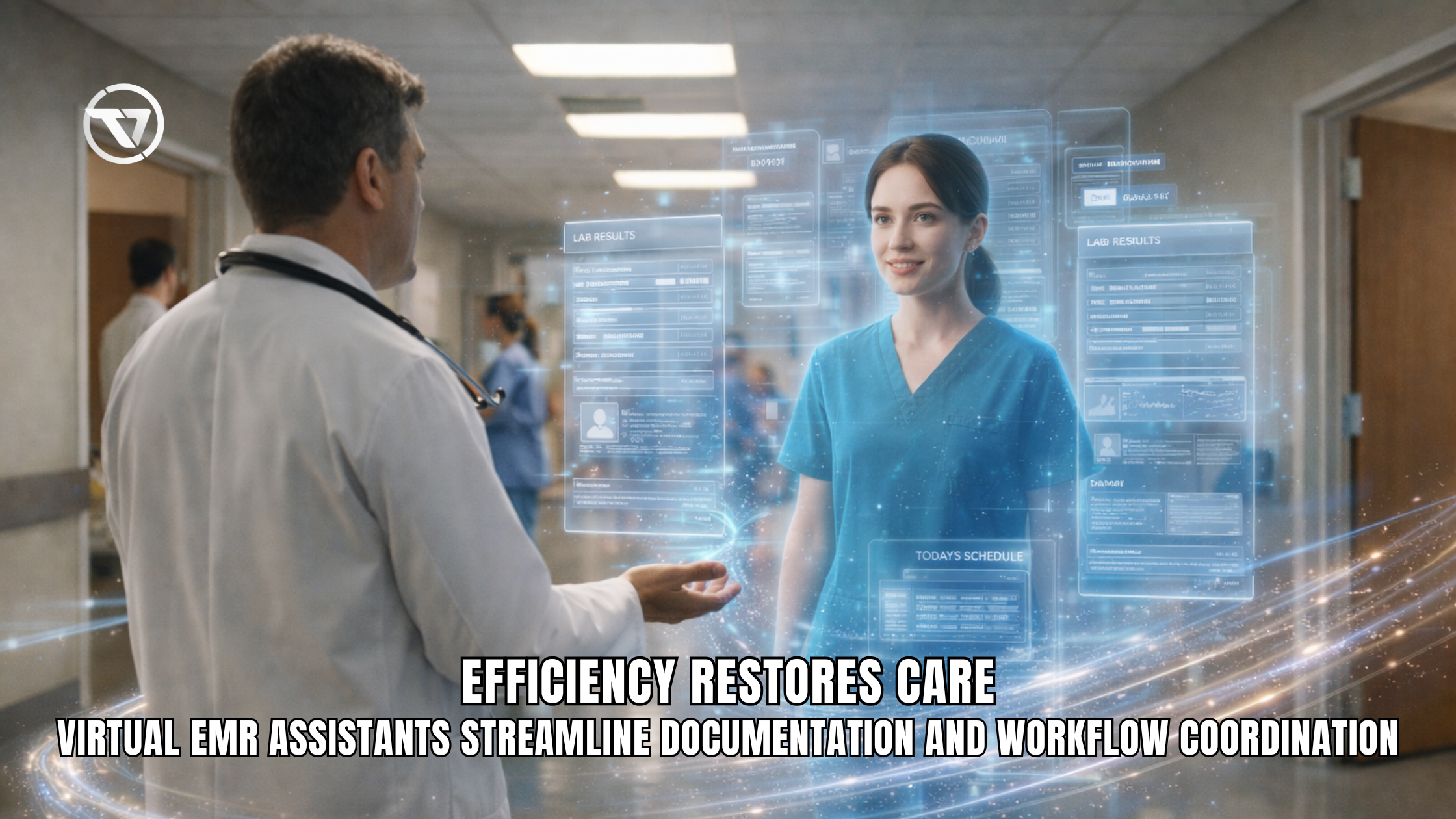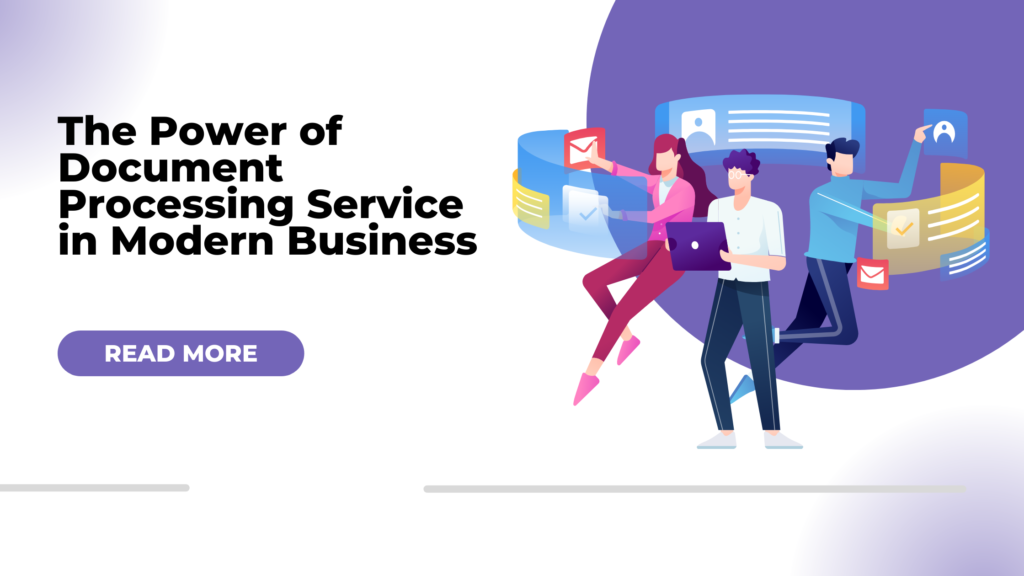
The Power of Document Processing Service in Modern Business
In today’s fast-paced business environment, handling vast amounts of data and documentation efficiently is critical to operational success. The traditional manual approach to document processing is not only time-consuming but also prone to errors, which can lead to compliance risks and missed business opportunities. This is where document processing services come into play, revolutionizing how organizations manage their documents by automating, streamlining, and enhancing the accuracy of data extraction and processing.
In this blog, we will explore the growing importance of document processing services, the technology driving this transformation, industry-specific applications, and how outsourcing to expert providers like TaskVirtual can amplify your business efficiency.
What is Document Processing Service?

At its core, a document processing service automates the capture, extraction, validation, and management of data from a wide variety of documents—such as invoices, contracts, forms, receipts, and emails. These services typically employ advanced technologies including Optical Character Recognition (OCR), Artificial Intelligence (AI), and Machine Learning (ML) to transform unstructured or semi-structured data into structured, actionable insights.
The demand for such services has soared as companies seek to digitize operations and reduce reliance on manual data entry. The result is faster turnaround times, higher accuracy, and significant cost savings. For example, according to Grand View Research, the global intelligent document processing market was valued at approximately $2.3 billion in 2024, with expectations to skyrocket to over $12 billion by 2030 due to accelerating adoption across industries.
Technologies Powering Document Processing Services
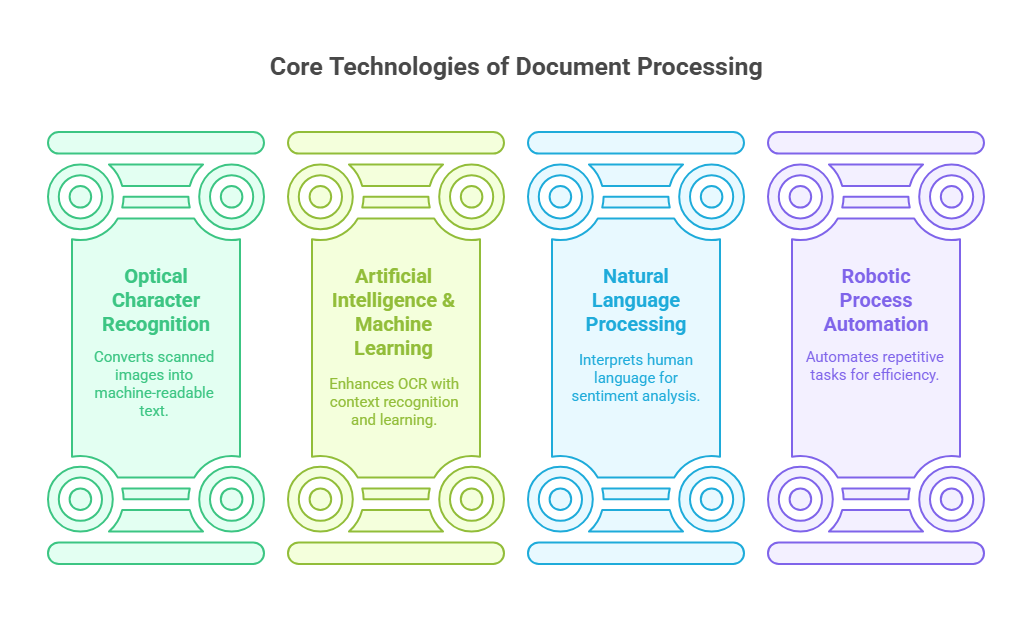
The backbone of any modern document processing service is its technology stack. Several key technologies contribute to making document processing smarter and more efficient:
1. Optical Character Recognition (OCR)
OCR is the foundational technology that enables the conversion of scanned images or PDFs of text into machine-readable text. While traditional OCR was limited to printed text, modern OCR can also capture handwriting and complex layouts, making it versatile for different document types.
2. Artificial Intelligence (AI) and Machine Learning (ML)
AI and ML enhance OCR by enabling systems to recognize context, extract relevant information, and learn from corrections to improve accuracy over time. This is especially important for processing semi-structured or unstructured documents where data may not follow a fixed format.
3. Natural Language Processing (NLP)
NLP allows systems to understand and interpret human language within documents, such as contracts or emails, enabling sentiment analysis, intent detection, and classification.
4. Robotic Process Automation (RPA)
RPA can automate repetitive tasks such as data entry, validation, and workflow orchestration, reducing manual intervention.
These technologies combine to deliver intelligent document processing (IDP) solutions, a rapidly growing market segment. According to IMARC Group, the IDP market is forecasted to grow at a CAGR of over 35% through 2033, reflecting its transformative potential.
Benefits of Using Document Processing Services

Investing in document processing services offers numerous tangible benefits that impact multiple areas of a business:
1. Improved Accuracy and Reduced Errors
Manual data entry is prone to human error, leading to costly mistakes, regulatory non-compliance, or flawed decision-making. Automated processing drastically reduces errors by using validation checks and continuous learning algorithms.
2. Faster Processing Times
Automated document processing speeds up data extraction from hours or days to mere minutes, accelerating workflows such as invoice approval, loan processing, or claims adjudication.
3. Cost Savings and Operational Efficiency
By reducing reliance on manual labor, companies can significantly cut operational costs. The automation also frees up human employees to focus on higher-value activities.
4. Enhanced Compliance and Security
Automated systems ensure that sensitive information is handled securely and consistently, helping businesses meet regulatory requirements like GDPR or HIPAA.
5. Scalability and Flexibility
Document processing services can easily scale to handle fluctuating volumes, especially important for industries with seasonal surges such as retail or finance.
Industry Applications of Document Processing Service
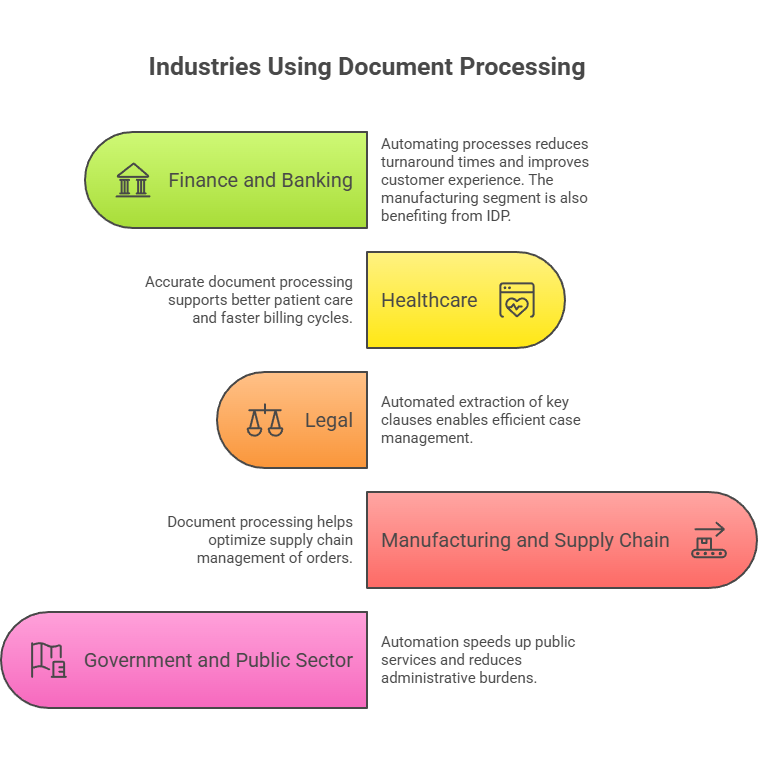
The adoption of document processing services spans numerous industries, each with unique document challenges:
1. Finance and Banking
Financial institutions handle vast volumes of documents like loan applications, KYC forms, and transaction records. Automating these processes reduces turnaround times and improves customer experience. The manufacturing segment is also benefiting from IDP, expected to grow at a CAGR of 34.3% by 2030.
2. Healthcare
Healthcare providers process patient records, insurance claims, and regulatory paperwork. Accurate document processing supports better patient care, faster billing cycles, and regulatory compliance.
3. Legal
Law firms rely heavily on contracts and legal documents. Automated extraction of key clauses and dates enables more efficient case management.
4. Manufacturing and Supply Chain
Document processing helps track orders, invoices, shipment records, and compliance certificates to optimize supply chain management.
5. Government and Public Sector
Government agencies manage citizen data, tax documents, and permits. Automation speeds up public services and reduces administrative burdens.
Why Outsource Document Processing Services?
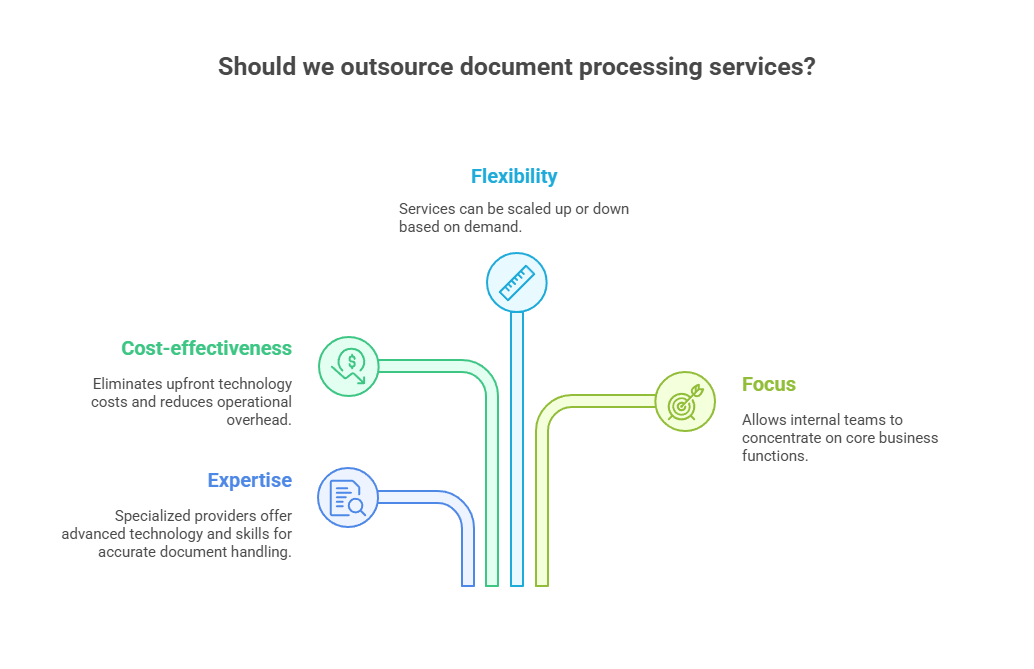
While many companies attempt to build in-house document processing capabilities, outsourcing offers unique advantages:
1. Expertise:
Specialized service providers have the technology, skills, and domain knowledge to handle complex documents accurately.
2. Cost-effectiveness:
Outsourcing eliminates the need for upfront technology investment and reduces operational overhead.
3. Flexibility:
Providers can easily scale services up or down based on demand.
4. Focus:
Outsourcing allows internal teams to concentrate on core business functions rather than document management.
This is where companies like TaskVirtual come into play.
TaskVirtual: Your Partner for Efficient Document Processing Service
TaskVirtual is a leading provider of virtual assistant services, including expert document processing services tailored to help businesses unlock productivity and reduce costs. Here’s why partnering with TaskVirtual makes a difference:
1. Expert Consultation on AI-Enhanced Document Processing
TaskVirtual provides specialized consultation on integrating AI-powered tools to optimize document workflows. They help select the right technologies such as OCR, NLP, and RPA tailored to your business needs.
2. Affordable Pricing Models
With competitive pricing starting as low as $3.12/hour up to $14.99/hour, TaskVirtual offers flexible packages that suit small businesses to large enterprises. This affordability ensures that even startups can leverage cutting-edge document processing technology without significant capital expenditure.
3. Proven Track Record and Customer Satisfaction
TaskVirtual boasts 364 positive reviews with an average rating of 4.7 stars across multiple VA review platforms, demonstrating high client satisfaction through reliable and quality service delivery.
4. Scalability and Custom Solutions
TaskVirtual adapts services to match your fluctuating document processing demands, ensuring you only pay for what you need while maintaining consistent accuracy and speed.
5. Secure and Confidential
With stringent security protocols, TaskVirtual ensures that your sensitive documents and data remain confidential and compliant with industry regulations.
Outsourcing document processing to TaskVirtual not only improves efficiency but also empowers businesses to stay competitive in a digital-first marketplace.
Future Trends in Document Processing Service

The document processing industry is evolving rapidly, driven by advances in AI, cloud computing, and data analytics. Some key trends to watch include:
1. Increased Cloud Adoption
Cloud-based document processing solutions offer flexibility, remote accessibility, and lower IT maintenance costs. The market is seeing a significant shift towards cloud deployments, with projections showing cloud solutions reaching nearly $1.9 billion in revenue by 2025.
2. Enhanced AI Capabilities
AI will continue to improve, enabling better contextual understanding, multilingual document processing, and predictive analytics to anticipate document-related business actions.
3. Integration with Business Process Management (BPM)
Seamless integration with BPM tools will allow document processing to become part of larger workflow automations, increasing end-to-end operational efficiency.
4. Focus on Data Privacy and Compliance
With growing regulations worldwide, document processing services will invest heavily in compliance features to protect sensitive data and meet legal standards.
Conclusion
The era of manual document handling is fading as intelligent, automated document processing services prove their value across industries. These services enhance accuracy, reduce operational costs, speed up workflows, and ensure compliance—benefits no modern organization can afford to ignore. With technology continuously evolving and outsourcing options like TaskVirtual available, businesses have every reason to embrace document processing services to stay competitive and future-ready.
If your business deals with large volumes of documents and data, consider leveraging TaskVirtual’s expert virtual assistants and AI-powered solutions to streamline your document workflows today.



